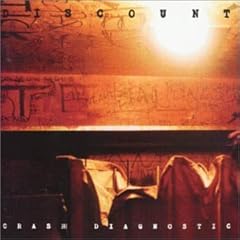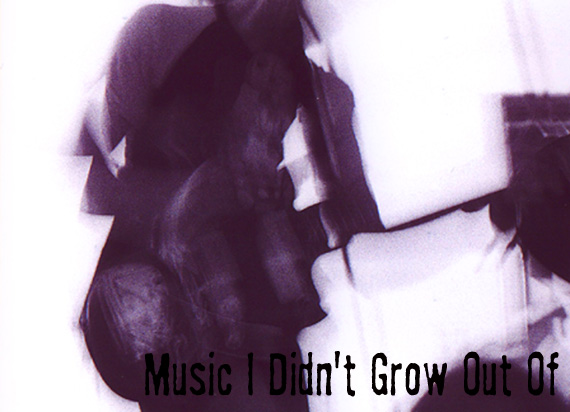I've never liked the Kills-- I saw them at Montreal's Sala Rossa on their first tour in 2003 and found their late arrival to smacked-out garage blues totally unremarkable. They were doing little more than aping the equally tiresome Royal Trux, whose skag-rock usually forgot that Johnny Thunders wrote great songs in addition to being a dashing junkie. I watched unconvinced as Mosshart and Hince (or VV and Hotel, as they'd cringingly rechristened themselves) gambolled about the stage playing rawk gawds, and amping up some role-play routine where they pretended to have a creepy abusive relationship. They primped, attitudinal and devil-may-care, but the substandard garage rock they squeezed out was flat and rehearsed and lacking totally in danger or surprise--hardly worth copping attitude over. It hurt the most, though, because I'd loved Discount, and though prior to the live Kills set I'd found their debut EP uninspired and pretentious, I was convinced that seeing Alison (uh, VV?) on stage again would redeem everything.
The first time I saw Discount was at the old Café Chaos on St Denis, across from the Cartier-Latin theatre, in October of 1999. They played a more-than-sold out show with Born Dead Icons and Fifth Hour Hero, both still in the relatively early stages of their trajectories. Jeff "Ghost Pine" Miller insisted I come, though at the time I was still listening largely to dumb garage punk and looked down on pop-punk for not being, er, genuine enough (an absurd thought from the point of view of garage rock, but I was in my early 20s). Jeff kept telling me it would be worth it, first when he convinced me to meet up with him, then when we got turned away at the door of the sold out show, then at the coffee shop where we waited through the opening bands, and finally before sneaking in with the crowd before the headline set.
We nudged our way to the front through the morass as Discount careened into their first song, and my first impression was that they were fronted by a young girl on a lot of drugs. It took me a few minutes to recognize that the stupourous trance that gripped Mosshart disappeared at the end of each song, when she'd suddenly become a shy girl in her late teens, eyes downcast and chin shrugged into her chest, quietly saying a few words about the band and their tour or thanking people for clapping. Then a new song'd start and she'd be once more gripped with musical fits. It could have been pretentious, were it not simply so weird-- there was nothing cool about her comportment, which suggested equal parts spiritual possession, traumatic shock, and grand-mal seizure. Mosshart looked crazed, her eyes fixing at random on the floor and ceiling and speakers, mouth muttering and contorting and hanging open when she wasn't singing, as she snapped at herself totally out of time with the music, contracting, expanding, shaking uncontrollably and apparently surprising herself. Utterly awkward in the most refreshing way, it appeared to be happening beyond her control, and while there were moments when she looked embarrassed by it, these were always overtaken and distracted by her own performance.
The greatest contrast was, however, her singing-- she sang sweetly, in a young, pure voice, with high melody and yearning earnestness. The band behind this was tight and loud and they played what would probably be called, derisively, pop-punk. It was melodious, and it was punk too-- loud and exhilarating rock and roll that you could shake to, which I was doing, startled by how good the music was and totally focused on the band, hoping as one hopes amidst all great sets that they would never stop playing and that time would instead stop and leave me suspended aloft in the feeling of joy that I felt hearing and watching them play.
It would be a shame to write Discount off as pop-punk the same way one sweeps aside the army of overproduced boy bands begging meal tickets from the extreme-sport-energy-drink demographic. Jawbreaker influence aside, Discount didn't quite sound like anyone else at the time, and if they did it was only because they sounded young. They sounded mainly like themselves, and expressed the emotions and concerns of young people in precisely the manner as punk rock is supposed to. They'd been booked, I recall, by local kids in an anarchist collective venue, and were touring across North America playing shows in houses and basements, bookstores, cafes, bars, whatever, at what might have been a post-internet but pre-file sharing, pre-Myspace height of actually independent music. They were young and they made music about being young for young people. As many problems are inherent in that aside, they did it perfectly and their records today resonate with that youth above all.
 Last week in Florida, Ang and I listened to Half Fiction and the second disc of the band's Singles collection, featuring mostly tracks from the later years. Because we were staying less than an hour from Vero Beach, Discount's hometown, it seemed appropriate, but there's something doubly satisfying about complementing the sun and warm salt-seasoned air with youthfully exhuberant songs played hard and and melodic and loud. We gave both albums plenty of play, which I supplemented by listening to the Love, Billy EP of Billy Bragg covers on the beach, and concluded that Discount was still a great band.
Last week in Florida, Ang and I listened to Half Fiction and the second disc of the band's Singles collection, featuring mostly tracks from the later years. Because we were staying less than an hour from Vero Beach, Discount's hometown, it seemed appropriate, but there's something doubly satisfying about complementing the sun and warm salt-seasoned air with youthfully exhuberant songs played hard and and melodic and loud. We gave both albums plenty of play, which I supplemented by listening to the Love, Billy EP of Billy Bragg covers on the beach, and concluded that Discount was still a great band.But I came to the following conclusion too-- the band was really at its apex when they recorded Half-Fiction. It's the best Discount album-- their debut, Ataxia's Alright Tonight, is good but uncertain juvenalia, and their final album, Crash Diagnostic is ambitious, but occasionally too much so. In the middle, Half-Fiction is the perfect balance. It's achingly well-played, tight, and full of driving momentum, and Mosshart's voice is sweet and plaintive, but more than that she sounds frank. Half-Fiction as an album sounds like someone trying to tell you something about themselves, including the uncomfortable things, but not dwelling on them. At no point does the record sound like it cares or even knows that anyone's listening. Instead, it records a band lost in trying to play as well as they can to say what they want to say about what they feel. No one could sensibly apply Negative Approach's accusation to Half-Fiction-era Discount-- they may not have been for everyone, but they're weren't trying to be something they were not. There's almost an utter lack of posture in this record (particularly when considered in hindsight against The Kills, for whom posturing is central and actual expression sounds almost tertiary), and I'm not entirely sure who to blame for that, except perhaps that the band was young enough to have believed in punk's ethos that it's enough to say what you feel.
By contrast, Crash Diagnostic is the sound of a band aware of how many people are listening, and trying to rise to the demand of that. Interviews prior to the release of that album found
 Mosshart and other members of the band sensibly pointing out that they didn't want to go on making the same records forever, they wanted to develop, try new things, and grow. These are obviously important and worthy pursuits for musicians, especially musicians finding themselves acclaimed at an early age. Yet from a listener's perspective, too much of Crash Diagnostic is agonizingly self-aware-- it's an album played for an audience, in direct contrast to Half-Fiction which sounds like a band playing only for themselves. They play with post-rock, pay homage to Fugazi and the DC/Dischord sound in general (drummer Bill Nesper now lives in DC and plays in Dischord band Routineers with former Fort Reno promoter Amanda MacKaye), make the music more difficult, challenging, less direct, all things that were considered important in 2000. There are those little 37-second non-songs of noise and feedback and tape loops; there are spaces left silent and great attention to the dynamic between loud and quiet; there are mysterious lyrics that border equally on the poetic and the unintelligible; there's album design borrowed heavily from Fugazi's graphic style. And there's the album's most obvious lapse, Mosshart's affectation in some songs of a quasi-English accent (now a constant, judging from her interviews as member of the Kills), which can be only partly explained away by recalling that she was 17 when the previous album came out and, at 20 when she made Crash Diagnostic, and was still discovering her voice.
Mosshart and other members of the band sensibly pointing out that they didn't want to go on making the same records forever, they wanted to develop, try new things, and grow. These are obviously important and worthy pursuits for musicians, especially musicians finding themselves acclaimed at an early age. Yet from a listener's perspective, too much of Crash Diagnostic is agonizingly self-aware-- it's an album played for an audience, in direct contrast to Half-Fiction which sounds like a band playing only for themselves. They play with post-rock, pay homage to Fugazi and the DC/Dischord sound in general (drummer Bill Nesper now lives in DC and plays in Dischord band Routineers with former Fort Reno promoter Amanda MacKaye), make the music more difficult, challenging, less direct, all things that were considered important in 2000. There are those little 37-second non-songs of noise and feedback and tape loops; there are spaces left silent and great attention to the dynamic between loud and quiet; there are mysterious lyrics that border equally on the poetic and the unintelligible; there's album design borrowed heavily from Fugazi's graphic style. And there's the album's most obvious lapse, Mosshart's affectation in some songs of a quasi-English accent (now a constant, judging from her interviews as member of the Kills), which can be only partly explained away by recalling that she was 17 when the previous album came out and, at 20 when she made Crash Diagnostic, and was still discovering her voice.Even then, it's not a bad album by any stretch, and its best songs are just great. Those are the moments when it sounds like Discount forgets, briefly, who they're playing for-- and they sound once more like kids expressing themselves through music, instead of an acclaimed band working on more challenging material. As a whole, Crash Diagnostic ends up sounding like a solid entry into a wide field of competitors, whereas with Half-Fiction, Discount was far and away the best band out there playing young songs for young people. I still quite like Crash Diagnostic and listen to it from time to time (each time remarking, "This is so much better than I remember it being"), but not half as often as I play Half-Fiction, which remains a flawless document-in-song of being young.



No comments:
Post a Comment